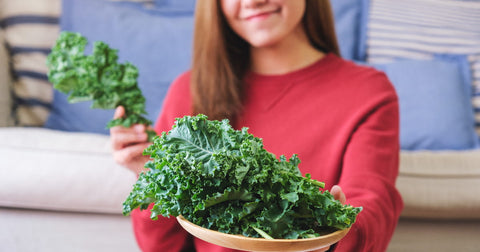Kale, a leafy green superstar, is packed with vitamins, minerals, and antioxidants. But despite its nutritional prowess, kale has a reputation for causing digestive woes like gas and bloating. If you're a woman who's eager to reap kale's health benefits without sacrificing digestive comfort, this article is for you.

We'll explore the digestive effects of kale, provide practical tips on how to eat it properly, and offer insights into managing food intolerances for optimal gut health.
Understanding Kale's Nutritional Powerhouse
Kale is a cruciferous vegetable, a family known for its high content of:
-
Fiber: Promotes regularity and feeds beneficial gut bacteria.
-
Vitamins: Rich in vitamins K, A, and C, essential for bone health, vision, and immunity.
-
Minerals: A good source of calcium, potassium, and iron.
-
Antioxidants: Contains powerful antioxidants that protect against cell damage.
How to Eat Kale: Minimizing Digestive Discomfort
While kale is undeniably nutritious, its high fiber content can lead to digestive issues for some. Here's how to eat kale and minimize discomfort:

-
Start Slowly: If you're new to kale, start with small portions and gradually increase your intake as your body adjusts.
-
Massage Your Kale: Massaging kale leaves with olive oil or lemon juice can help break down the tough fibers, making it easier to digest.
-
Choose Tender Varieties: Baby kale or Tuscan kale tend to be more tender and less fibrous than curly kale.
-
Cooking Methods: Cooking kale can also make it easier to digest. Try steaming, sautéing, or adding it to soups and stews.
Does Kale Make You Gassy?
Yes, kale can cause gas and bloating in some individuals. This is because it contains raffinose, a complex sugar that our bodies can't fully break down. When raffinose reaches the large intestine, it's fermented by gut bacteria, producing gas as a byproduct.
Does Kale Make You Poop?
Yes, kale can promote regular bowel movements due to its high fiber content. Fiber adds bulk to your stool and helps it move through your digestive system more efficiently.
Kale Side Effects: What to Watch For
While kale is generally safe and healthy, some people might experience side effects, including:

-
Gas and Bloating: As mentioned earlier, kale can cause gas and bloating due to its fiber content.
-
Diarrhea: In some cases, consuming large amounts of kale might lead to loose stools or diarrhea.
-
Stomach Cramps: The gas and bloating associated with kale can also trigger abdominal cramps.
Does Kale Cause Gas in Everyone?
No, not everyone experiences gas after eating kale. Individual tolerance varies depending on your gut microbiome (the community of bacteria in your gut) and your overall digestive health.
Does Kale Make You Bloated?

Bloating is a common side effect of consuming kale, especially for those with sensitive digestive systems or those who are not used to eating high-fiber foods.
Is Kale Hard to Digest?
Kale can be harder to digest than some other vegetables due to its high fiber content and tough leaves. However, proper preparation methods, such as massaging or cooking the kale, can make it easier on your digestion.
Can Kale Cause Diarrhea?
Yes, consuming a large amount of kale can sometimes lead to diarrhea, especially if you're not used to a high-fiber diet or have a sensitive gut.
Food Intolerance and Digestive Health
If you experience persistent digestive issues after eating kale or other foods, consider the possibility of a food intolerance or sensitivity.
A food sensitivity test kit can help you identify specific foods that might be triggering your symptoms. By eliminating or reducing these trigger foods, you can potentially alleviate your digestive problems and improve your overall gut health.

Key Takeaways:
-
Kale is a nutritious vegetable, but its high fiber content can cause digestive issues for some people.
-
Proper preparation methods, such as massaging or cooking kale, can make it easier to digest.
-
If you experience digestive discomfort after eating kale, consider a food sensitivity test to identify potential food intolerances.
Remember, this article is intended for informational purposes only and should not be considered a substitute for professional medical advice. If you have any concerns about your digestive health, consult a qualified healthcare professional.
Frequently Asked Questions:
1. What are some ways to cook kale that make it easier to digest?
Steaming, sautéing, and roasting are all great options for making kale more digestible. These methods help break down the tough fibers and reduce the potential for gas and bloating.
2. Can I eat kale raw?
Yes, you can eat kale raw, but it might be more challenging to digest for some people. If you choose to eat it raw, try massaging the leaves with olive oil or lemon juice to soften them. You can also opt for baby kale or Tuscan kale, which have more tender leaves.
3. How much kale should I eat per day?
Start with small portions (about 1 cup cooked or 2 cups raw) and gradually increase your intake as your body adjusts. Listen to your body and adjust your intake based on your tolerance.
4. Is kale safe for people with irritable bowel syndrome (IBS)?
Kale can be a tricky vegetable for those with IBS due to its high FODMAP content. If you have IBS, it's best to start with very small portions of well-cooked kale and monitor your symptoms.
5. I'm experiencing digestive issues after eating kale, but I don't think it's related to the fiber. Could it be something else?
Yes, it's possible to have a food intolerance or sensitivity to kale. If you experience symptoms like bloating, gas, or diarrhea after consuming kale, consider a food sensitivity test to identify potential triggers and make informed dietary choices.


.png?v=1737390083)
.png?v=1737187409)

